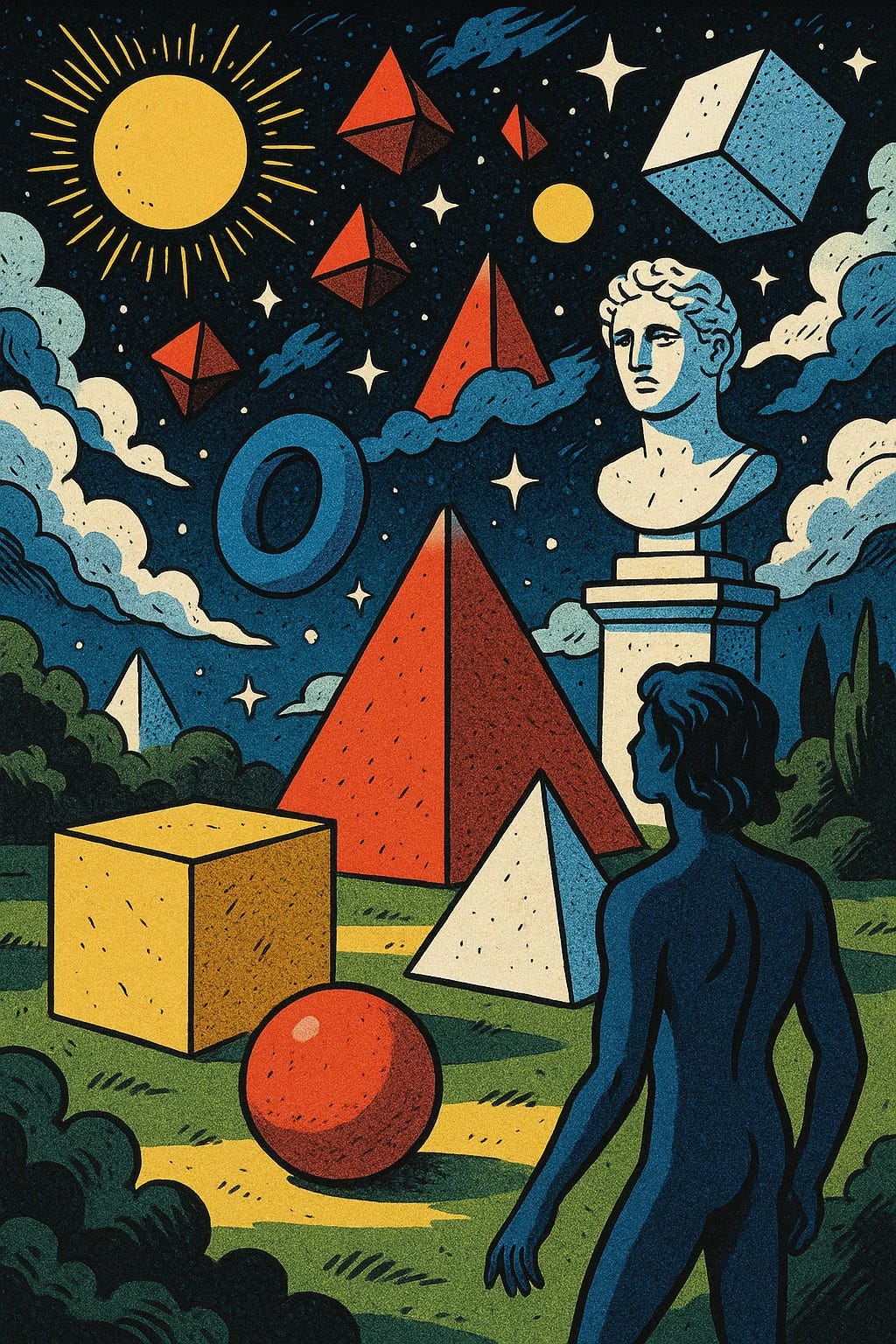Introduction
What is really real? Is it matter? Energy? Ideas? Mathematics? The Universe? Emptiness? Or are these all just abstractions? And if they are, are abstractions real?
The TLDR is: It’s all real. Sort of.
But don’t DR. R on…
Intro to Plato's Forms
What is it that makes a thing what it is? A part of it is its material, but the same material can be made into different things. An aluminium can may be recycled into part of a bike or a plane. But a can is not a bike or a plane. So what gives it its "can-ness"?
For Plato, it was the "Forms", or "Ideas", that account for each thing's distinctive thing-ness. An aluminium can is aluminium that somehow has within it the Form "can". If it is recycled into an aeroplane, it then has the Form "aeroplane". It embodies that Idea within the world.
Each particular instance of an aeroplane participates in the same Form "aeroplane", which is why we can say that they are instances of the same thing. Each particular aeroplane is a physical thing, but the Form "aeroplane" is present in all of the scattered particulars and, as a result, the Forms must in some sense be immaterial. Plato conceived them as existing in some kind of special immaterial "realm" (we'll come back to this point later).
It is thanks to the Forms that the universe is intelligible. We understand the world around us by way of recognising the underlying Form for each thing we encounter. This is what lets us know that a brick house is not a brick road, and should not be treated the same.
The Indeterminacy of the Forms
Forms are always essentially indeterminate. That is to say, they leave out certain details. If you are told something has the Form "man", you do not know if he is tall or short, black or white, bearded or clean-shaven, old or young, etc. But if you are pointed to a particular man, let's say Socrates, we know that he was notoriously ugly, having a flat turned-up nose, bulging eyes and a large belly, and neglected his personal hygiene.1 The particular instance carries a lot more information than the universal Form.
We might consider an even more general Form, such as "mammal" rather than "man". We have now lost even more details. We do not know if we are talking about a male or female, an ape or a bat, a meat-eater or a herbivore. We only have a vague and indeterminate idea "mammal", telling us it can grow hair, produce milk, and shares a certain evolutionary lineage. The rest remains a blank. And as we look at higher and higher level categories, we find the blanks extend further and further.
This is, however, a feature and not a bug. Each Form offers a more unified and simplified picture of the world, allowing us to get a mental grip on reality by excluding the details that are not relevant to us. If I want to mow a lawn, I want a lawn mower; I do not care about its colour, or its name, or its history, or every little scratch on its paint. We might also consider how a good map is useful precisely because it excludes so much unwanted detail, leaving only what is relevant for us. It is this exclusion/abstraction that makes the world intelligible, navigable, and predictable, and prevents us from living in constant information overload.
The "higher" we go through the Forms, the more unified and simplified the picture becomes. One universal can account for infinite particulars, by leaving out details and so simplifying the picture. And as we go on up the chain, excluding more and more details, each step covers more and more lower cases with a picture that is simpler and less determinate.
Matter
We can approach the question from another direction: matter. We will take a broadly Aristotelian view, where matter is understood as the component parts a thing is made out of. So the matter for a house may be wood. The wood, in turn, has fibres as its matter. Those fibres in turn are made of molecules, and so on...
In Western culture, matter is generally taken as what is most fundamentally real. The various "objects" and "substances" of everyday life are seen as being "mere arrangements" of matter. The underlying matter is the reality, and everything is ultimately just atoms/quantum foam.
I would argue that this is a mistake, and that it is the same mistake as taking the Platonic Forms to be what's "really real". It is confusing a useful abstraction for concrete reality itself2. When we look at a thing in terms of its matter/components, we are abstracting away how its component matter is arranged and how it relates both within itself and with the wider world. All of that is deliberately excluded from our analysis.
This exclusion leaves matter, just like the Forms, indeterminate. If I tell you I have some atoms in my pocket, you don't know if those atoms make up my hands, a knife, string, or even a precious ring. They could be nearly anything! If I tell you there is wood in my living room, it could be a log, a table, chairs, a hobby horse, or many other things. We are very far from having the full picture.

As with the Forms, this is a feature, not a bug. The indeterminacy of matter is what allows us to generalise and apply the properties of different materials across all instances of those materials. It simplifies and unifies how we understand the world, excluding the aspects we don't (presently) care about. If I want to know if an object is conductive, I do not need to know if it's a circle or a square.
And again, the further we go in our analysis of a thing's matter, the more indeterminate it becomes. If I tell you a thing is made of wood, you know much more than if I just told you it is made of plant fibres, and that tells you much more than if I simply say it's made of molecules. And as we go on down the levels of matter, excluding more and more higher-level details, each level covers more and more cases with a picture that is simpler and less determinate.
Are Our Abstractions Real?
We might at this point stop and ask, are all these abstractions real, and if they are, in what sense are they real?
We might be tempted to say that none of them are really real, and that all that is real is the fully determinate whole of reality, with nothing excluded. If we do that, we throw away everything. We lose not only the Forms, not only matter, but also other abstractions such as the laws of physics and the objects of mathematics. We would have to say that none of these things are really real. We could, however, still maintain that our various abstractions remain practically indispensable.
Alternatively, we might say that they are real substructures of the fullness of reality. They are not concretely real as actual things in the world, but they are real aspects of the world, with real implications. They are reality as it appears through a certain valid (but not exhaustive) scheme of abstractions, that captures a real part of the structure of reality, despite all being incapable of capturing the full picture.
A third possible answer would be to say that they primarily represent not a limited aspect of actuality, but a range of possibilities. So the Form, "man", for example, would be not just a certain substructure of actual reality, but the full range of possible determinate realisations of that substructure. The concept of "atoms", likewise, would include within itself the full range of possible configurations of atoms. The blank aspect of the abstraction, its emptiness, is its most important element, just as the variables "x" and "y" are the heart of an equation, or how the hollow is the main part of the bowl. In that case, our abstractions are real possibilities, but not real actualities.
At this point, we need to ask, is "possibility" real, or is it merely an illusion resulting from our limited perspectives? It may be thought that the concept of "possibility" is just an artefact of our ignorance -- blank spaces in our knowledge of reality, not in reality itself. Reality, in that case, is fully actual and determinate. There is no space for genuine chance or free will, and time itself is an illusion. If we take that position, then taking the third answer above would mean abstractions are decidedly non-real.
Alternatively, we can accept possibility as a genuine part of reality. This fits nicely with our common sense picture of reality, where possibility is an inescapable part of everyday life, and something we cannot refuse to think about. Especially in the case of our own decisions, we cannot live effectively if we refuse to consider our possible choices and instead just say "there is only one choice that is really possible, and that one is inevitable". We have to live as if the future is undecided, if we want to make good choices and live well.
I will also note that the idea that possibility is an illusion resulting from limited perspectives only makes sense if we suppose there is some unlimited perspective with the full picture. For reasons I've gone into elsewhere, I do not believe this is the case.
Returning to the second answer (that abstractions represent substructures), this answer has a problem in that it fails to account for mathematics. For the empirical sciences, we might fairly view their various concepts as representing real substructures of reality, uncovered through careful observation. But this is simply not how mathematics is done. Mathematics is played out in the imaginations of mathematicians, exploring the different possibilities of structure that might be achieved. These structures may be found in reality, but there is no requirement for them to be. And crucially, mathematics cannot be either falsified or confirmed by empirical observations. It simply does not care for physical reality. (I wrote more about the nature of mathematics as exploring possibility in this post.)
For all these reasons, I think a combination of the second and third answers is correct, and that possibility should be accepted as a genuine aspect of reality.
This allows us to clarify what was meant earlier by the immaterial "realm" of Forms. We can understand it as a "space" of possibilities. We explore this possibility space every day, via our imaginations and via experimenting with new things. This helps resolve the epistemological problems of the theory of forms, since we no longer need to view the realm of Forms as inaccessible to us. In fact, we are engaged with it all the time.
The Ultimate Abstraction
If we continue these processes of abstraction to their limits, we eventually end up at the Neoplatonic idea of 'the One' (not to be confused with the romantic idea of 'the One'...) and the Aristotelian idea of 'prime matter'. Both encompass the entire universe. Both are perfectly indeterminate, perfectly simple. They are the ultimate abstraction, excluding the entirety of reality and leaving behind only a single great blank. Pure indeterminacy, openness, possibility.
Is this ultimate abstraction real? And if it is, in what sense is it real?
It is clearly not real in the way that concrete actual reality is real. It is not something we can touch or change or locate.
Nor is it real as a substructure of reality. All that is determinate has been abstracted away from it. Our abstractions each present a simplified and unified picture of reality, but the One is simplification and unification to the point that no picture remains at all. It provides us with absolutely no information3.
But we can see it as representing real possibility — unlimited possibility. It doesn't tell us how things are, it tells us there are no ultimate limitations upon what may be. It tells us that none of our abstractions are the final word on reality. None of our fixed concepts or doctrines capture the fullness of reality. None are immutable.
The point is that there is no "ground" to reality. The ground is groundlessness. We're not standing on solid ground; we're mid freefall.
Over to you
Is materialism a case of mistaking an abstraction for reality itself?
Are the Forms a useful and salvageable concept?
Is possibility part of reality, or does it exist only in our ignorance?
Has Western philosophy neglected emptiness?
Let me know your thoughts in the comments!
This is what Whitehead's referred to as ‘the fallacy of misplaced concreteness'
In the context of Information Theory, information is understood as the reduction in uncertainty. For example, in a game of 'Guess Who?' with each question you narrow down the possibilities of who your opponent may be, reducing your uncertainty and so gaining information on who they are. In this context, it is unsurprising that the One should provide us no information. It does nothing to narrow down the possibilities, and in fact is nothing but possibility, nothing but indeterminacy.





A perhaps relevant quote: "when the doors of perception are cleansed, things are seen as they are; infinite" -- William Blake
I think Plato's forms are closest to being real as mathematical abstractions. The possibilities bring to mind quantum states.